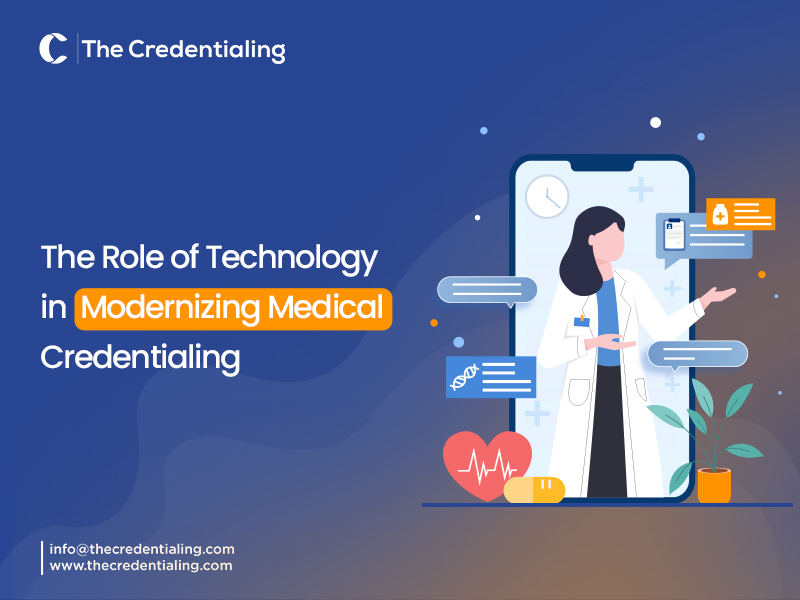The Role of Technology in Modernizing Medical Credentialing
In the healthcare industry, medical credentialing services are vital in verifying that healthcare professionals possess the required experience, licenses, and qualifications to deliver safe and effective care. It is the preliminary step in medical billing, as the insurance company must ensure that the patients receive quality services. Typically, the credentialing process was a manual task that required significant effort. It involved a lot of paperwork, increasing the chances of errors and privacy issues. But in the recent past, technology has transformed medical credentialing into a more efficient, accurate, and responsive system. In this article, we will explore how technological advancements modernize medical credentialing.
Automated Verification Processes
One of the key ways innovation is transforming medical credentialing is through the automation of verification processes. Regulatory bodies or insurance providers check a certain provider's education, training, licenses, and certifications during the credentialing process. In the past, all of these checks were performed manually, which led to an increased administrative burden and eventually slowed up the process. But now, these verification processes have been subjected to automation thanks to artificial intelligence (AI) and machine learning (ML). The resources and time dedicated to the verification have been dramatically reduced thanks to the innovation in medical credentialing. Automated checks ensure that healthcare providers are promptly credentialed once their qualifications are verified, leading to faster onboarding and increased efficiency in healthcare delivery. Automation also enhances accuracy by minimizing the risk of human error.
Blockchain in Credentialing
Blockchain is changing the healthcare industry and steadily progressing in the medical credentialing process. Through the use of blockchain, credentialing information is stored and exchanged securely and decentralized so that once the data is recorded, it cannot be changed or manipulated in any way, offering healthcare professionals an accurate record of their credentials. In the context of medical credentialing services, blockchain improves data security and data accuracy. This decentralized system makes information flow between hospitals, insurance companies, and other credentialing authorities involved in the process more fluid and less opaque. This paper concludes that using blockchain technology to store credentialing data makes the system more reliable and robust since it provides a single source of truth.
Cloud-Based Credentialing Platforms
Cloud-based platforms have played a crucial role in credentialing changes, enhancing medical credentialing efficiency and adherence to care. These platforms enable credentialing information to be stored and shared on a common repository, where it is easily retrievable by any authorized personnel from anywhere. Using an online credentialing system, healthcare organizations can modify, search, and store information in credentialing databases in real time, eliminating the turnaround time usually required by other methods. The positive scalability of cloud-based solutions means that credentialing data storage will be able to grow in line with volumes without adversely affecting speed or security. Furthermore, these reforms employ enhanced security features like end-to-end encryption for the security of their clients’ data, as well as frequent security assessments to curb cases of data breaches.
Digital Credentialing Wallets
Digital credentialing wallets can be considered the next big breakthrough in the field of medical credentialing. These wallets enable healthcare practitioners to keep their credentials in a digital format that can be easily accessed and shared with the employer, regulatory, or insurance bodies in accordance with the need. Additionally, mobile devices enable healthcare providers to effortlessly access their credentials, speeding up the verification and onboarding processes. Digital wallets employ strong encryption and authentication techniques to protect credentialing data and reduce the chances of fraud or data compromise. Digital credentialing wallets can reduce the burden of the credentialing process, increase the security and privacy of data, and contribute to the betterment of healthcare.
Telemedicine and Remote Credentialing
Telemedicine has emerged and brought about a shift in the conventional credentialing paradigm. Telemedicine specialists in the medical care sector ought to be endorsed in various states, all of which have differing permitting and credentialing prerequisites. Hospitals and other healthcare organizations can now avoid the need for physical face-to-face meetings to conduct credentialing through remote credentialing solutions. Tele credentialing stages allow virtual verification interviews, secure report transfers, and electronic accommodation of certifications. This not only answers the needs of telemedicine practitioners but also helps in the sustainability and flexibility of healthcare services. Remote credentialing reduces the limitations of geographical barriers and enables medical care organizations to access a broader market of qualified professionals.
Speed Up Your Credentialing Process with TheCredentialing Online Portal
Are you fed up with the long delays or unnecessary paperwork you face while getting credentialed with a new payer? Don't worry; TheCredentialing offers a one-stop solution for all your Credentialing woes. Our online portal streamlines the whole process for you. Say goodbye to paperwork, as our File Transfer Protocol (FTP) allows you to transfer heavy files in a brisk and efficient fashion. Our dashboard allows you to file as many applications as you want. Our dedicated professionals are just a text away if you find any difficulty. We also offer you a safe and secure payment channel from anywhere. You can view your application status anytime, anywhere.
